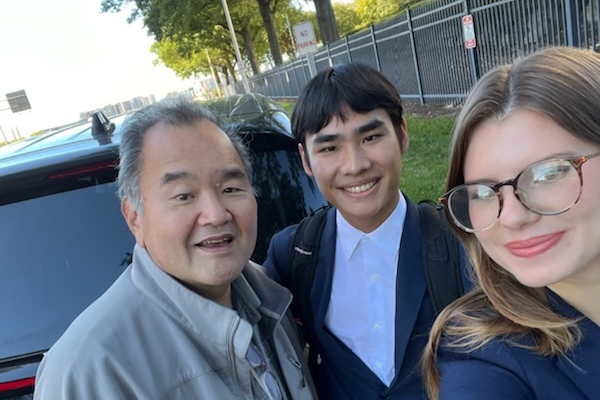W&L Students Attend Diverse Economics Conference at the Federal Reserve Bank of Richmond The Williams School and Department of Economics provided the opportunity for students to network and explore careers in the field of economics.
Three Washington and Lee students seized the opportunity to explore career paths in the field of economics by attending the sixth annual Diverse Economics Conference (DivEc) held at the Federal Reserve Bank of Richmond on Friday, Oct. 11.
The Williams School of Commerce, Economics and Politics, and the Department of Economics offer the opportunity to students taking introductory economics classes to demonstrate the various career tracks available to students majoring in economics. The university provided transportation to and from the free one-day event, which was attended by Jia Gao ’28, Dallas Bolen ’28 and Charlie Salome Sabines ’28.
“The conference provides W&L students with an exciting opportunity to see economics in action,” said Linda Hooks, head of the W&L Economics Department. “Students also have a chance to see the Federal Reserve Bank of Richmond in person and to interact with the economists working there. Economic policy impacts the world we live in every day, and it’s important for students to see that the economic techniques they learn in class have major real-world applications.”
The DivEc Conference featured several well-respected speakers and offered networking opportunities, as well as a look behind the scenes at what it’s like to work at the Richmond Fed office.
“Having the opportunity to talk with the current Fed employees and various panelists was my favorite aspect of the conference,” said Salome Sabines, a first-year student from Stafford, Virginia who is considering majoring in economics. “I particularly enjoyed these interactions because they allowed us to network, ask personal questions and learn even more about the unique opportunities available at the Federal Reserve.”
William M. Rogers III, vice president and director of the Institute for Economic Equity at the Federal Reserve Bank of St. Louis, served as the conference’s keynote speaker, while a panel of similarly esteemed economists offered advice on careers in the field. Among them were Brian Brown from the Virginia Commonwealth University School of Business; Sean Brazier, owner of EDai consulting; Sara Dunnigan, deputy director of the GO Virginia Economic Development program at the Virginia Department of Housing and Community Development; Tasher Easter, diversity and inclusion leader at the Richmond Fed; and Faraz Usmani, an applied microeconomist at Mathematica.
Gao, a first-year student from Winston-Salem, North Carolina, noted that among his most valuable takeaways from the conference was the advice offered by Rogers during his keynote address.
“He mentioned that we should ask ‘why’ more often,” said Gao, who is interested in an accounting major. “Upon reflection, I realized that asking ‘why’ is an excellent approach towards exploring different fields because only by trying something and looking deeper will I realize my potential. Dr. Rogers also said we should treat studies as a sport, where once you have an idea of your interests, you work hard to achieve it. Lastly, he explained how reducing inequality and poverty enhances society as a whole, which directly relates to the Poverty and Human Capability class I am currently taking here at W&L.”
Students attending the conference also learned about unique economic programs offered through the Fed and the variety of career opportunities that exist for those with degrees in economics, some of which they might not have previously considered.
“There is such a diverse array of options available with a bachelor’s degree in economics,” said Gao. “One presenter was a lawyer, primarily as a labor economist; another was a researcher for the Richmond Fed; and another used economics within the healthcare industry. I also realized that economics and mathematics appear to complement each other, as several of the presenters had strong mathematics backgrounds.”
A first-year student from Marietta, Ohio, Bolen also discovered the ability to pair an economics degree with other disciplines. The Johnson Scholar is considering degrees in both economics and biochemistry and discovered a direct connection through the conference’s networking opportunities.
“I learned a lot about the different career paths that exist in economics, and I met someone who had studied both biochemistry and economics,” she said. “I was super excited to bond with her and ask questions. Ultimately, I learned that I could overlap economics with any passion or niche interest I have, and I am excited to do this one day in my professional life with biochemistry.”
Salome Sabines also discovered that careers, including those in economics, don’t necessarily have to follow a linear path.
“I discovered that you can work, go to graduate school or do an internship in any order,” he said. “For example, I could intern during my four years at W&L, work and shadow at the Federal Reserve or work in the private sector and then decide what to do. I will use this information to decide which classes, programs and extracurricular activities I should take and be involved in during my time at W&L.”
The DivEc Conference was hosted by the Richmond Fed in partnership with the Robins School of Business at the University of Richmond and the School of Business at Virginia Commonwealth University.
If you know a W&L student who has done great, accolade-worthy things, tell us about them! Nominate them for an accolade.
 Jia Gao ‘28 and Dallas Bolen ‘28 with driver Chris Shiraki
Jia Gao ‘28 and Dallas Bolen ‘28 with driver Chris Shiraki
You must be logged in to post a comment.